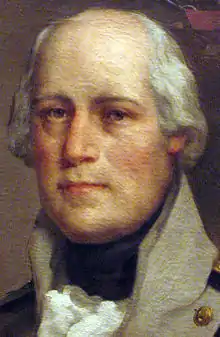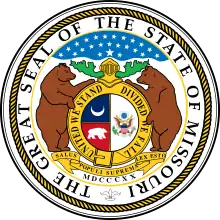Benjamin Howard (Missouri politician)
Benjamin Howard (1760 – September 18, 1814) was a Congressman from Kentucky, the first governor of the Missouri Territory and a brigadier general in the War of 1812.
Benjamin Howard | |
|---|---|
 | |
| Personal details | |
| Born | 1760 Lexington, Kentucky |
| Died | September 18, 1814 (aged 53–54) |
| Alma mater | College of William & Mary(1797) |
Howard was born in Lexington, Kentucky (then part of Virginia) and graduated in 1797 from the College of William & Mary. He was elected to the Kentucky General Assembly in 1800. He served in the 10th and 11th Congresses from Kentucky from 1807 until April 10, 1810. One week later, on April 17, 1810, James Madison appointed him Governor of the Louisiana Territory (the Louisiana Purchase district north of modern-day Louisiana), which was later renamed as the Missouri Territory in June 1812.
He resigned his post during the War of 1812 to become brigadier general of the Eighth Military Department. During the conflict he and Nathan Boone (Daniel Boone's youngest son) attacked Sac and Fox positions in Illinois and established Fort Clark by Peoria, Illinois.
He fell ill on the way back and died in St. Louis, Missouri. His original burial location is unknown, although likely somewhere in downtown St. Louis. He was moved to the Old Grace Church Graveyard just north of downtown St. Louis (11th and Warren Street) sometime between 1817 and 1844. He was then (allegedly) transferred to Bellefontaine Cemetery sometime after 1851. However, the cemetery has no record of Howard's interment; therefore, the true location of his body remains a mystery.
Fort Howard in Green Bay, WI was named after him in 1816.
Benjamin Howard is the namesake of Howard County, Missouri.[1]
Notes
- Eaton, David Wolfe (1916). How Missouri Counties, Towns and Streams Were Named. The State Historical Society of Missouri. p. 174.
References
- United States Congress. "Benjamin Howard (id: H000834)". Biographical Directory of the United States Congress.
| U.S. House of Representatives | ||
|---|---|---|
| Preceded by John Fowler |
Member of the U.S. House of Representatives from Kentucky's 5th congressional district 1807–1810 |
Succeeded by William T. Barry |
| Political offices | ||
| Preceded by Meriwether Lewis |
Governor of Louisiana and Missouri Territory 1809–1812 |
Succeeded by William Clark |
